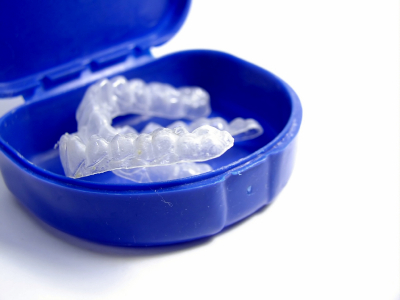Is it normal to have pain or sensitivity after teeth whitening/bleaching? Before we answer the question, it helps to understand how the whitening process works.
How Teeth Whitening Works

When bleaching gel is applied to your teeth, it penetrates them and travels through small channels in your teeth to break down stains. The whitening process continues even after the gel is rinsed off your teeth. It is important to see a dentist who can anticipate the effects of bleaching your teeth in advance of the treatment.
What Causes Sensitivity or Pain with Teeth Whitening?
Decay
The layers of your teeth—inside and out—are affected by untreated cavities. If your tooth pulp is affected by decay, the nerves will become sensitive to heat, cold, and other things that come in contact with your teeth.
Leaking restorations
If any of your teeth were restored—with fillings, dental crowns, veneers, or some other treatment—but are now worn or not correctly bonded or sealed, bacteria can leak in and promote decay and irritate the tooth. Sensitivity and pain can result when whitening gel is applied to your teeth.
Gingival recession
When your gums recede, or pull away from your tooth roots, the exposed roots are sensitive to temperature changes. Teeth bleaching gel will cause even more sensitivity.
Cracks or other damage
Bleaching gel penetrates your teeth, and that includes the areas where there are cracks or other damage. Areas that are already irritated will feel a bit worse.
Dentin tubules
Small channels in the dentin (layer beneath the enamel) transfer sensations to the inner tooth. Bleaching gel seeps into the channels and opens their natural plugs. As the gel seeps in, some people experience sensitivity it flows through the tooth nerves.
What Can Be Done About Sensitivity
Before your teeth are whitened, your dentist will ensure your teeth and gums are healthy and free of decay. If you’ve already received teeth whitening from your dentist and are experiencing lingering or significant pain or sensitivity, let your dentist know right away.
Use a less potent whitening gel
As your dentist determines the level of sensitivity in your teeth, he or she will recommend the appropriate strength of bleaching gel. Your treatment period might be longer than it would be with a higher strength gel, but the pain or sensitivity you feel will be limited.
Shorten the whitening session
Each whitening session can last 30 minutes to an hour or longer. If you have pain or sensitivity after whitening your teeth, the sessions can be shortened. This post is sponsored by Baton Rouge dentist Dr. Steven Collins of Sherwood Dental Care.